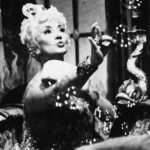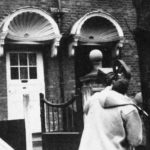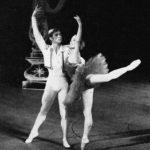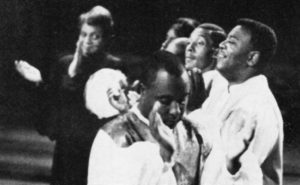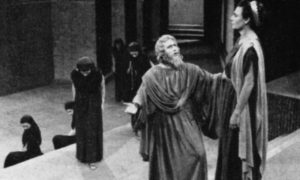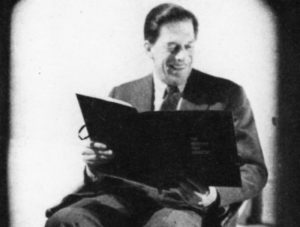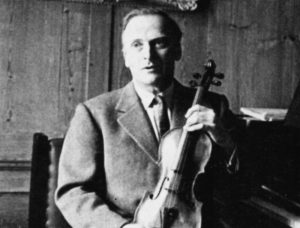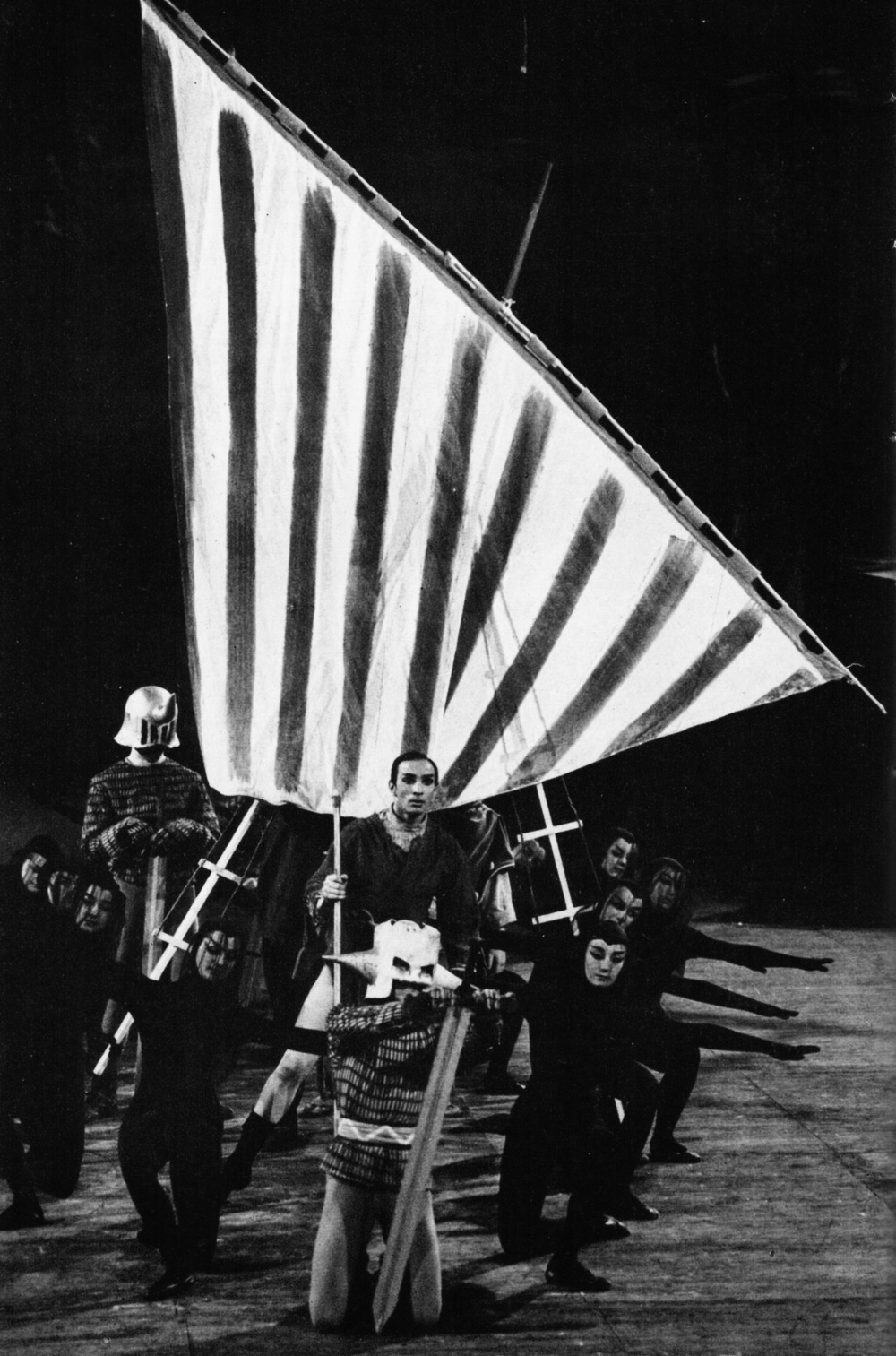
Television may itself be regarded as an art-form and in a very real sense everything produced for television may be described as belonging to the Arts. Certainly a wide range of specialised artistic and technical skills enter into every programme of whatever kind. Television is a creative activity, and effective television calls for a high degree of artistic judgment.
Drama
In terms of the volume of production, television’s main contribution to the Arts in a narrower sense is the whole range of drama. A single good drama production on television is seen by an audience large enough to fill a theatre for a decade. Independent Television’s contributions in this field are considered in a separate chapter.
Opera and Ballet
In dealing with many fields of human activity, television can add a new dimension or a new understanding. The attractions of certain of the performing arts, however, depend upon elements which television cannot always capture. Conventional opera and ballet often do not readily lend themselves to presentation on television. It is difficult for the camera to provide the necessary balance of detail and spectacle, and colour is often an important part of the whole. However, full-scale operas and ballets have been successfully presented from time to time on Independent Television, for example in Granada’s television presentation of the Sadler’s Wells production of Orpheus in the Underworld and The Four Brothers, a modern mime and ballet production by the Brussels Twentieth Century Ballet.
Excerpts from ballet and opera by small groups of performers are presented quite frequently as items in general programme series, and a few programmes or series have dealt specifically with opera or ballet. It is by no means unusual for artistes of the calibre of Nureyev and Nadia Nerina to appear in light entertainment programmes seen by up to twenty million viewers. A regular series of programmes dealing with the history and performance of ballet was presented by Anton Dolin for Tyne Tees Television.
Music
Television producers have devoted much attention to the development of techniques for presenting orchestral concerts. This is a difficult task: visual interest soon wavers if the whole orchestra is shown on the screen; on the other hand, the constant movement of cameras from section to section of the orchestra or about the concert hall is found distracting by many music-lovers. The major advantage which television has over sound broadcasting is the visual interest to be gained from close-ups of the hands of a pianist, conductor, or string-player. For this reason the more successful presentations of classical music on television tend to be in concertos, recitals or programmes of musical instruction.
Art
Despite the disadvantage of being confined to monochrome, a number of successful art programmes have been presented on television. Sir Kenneth Clark has continued his lectures, the most recent series dealing with the works of Rembrandt (ATV). John Betjeman has taken part in a number of programmes, including a series on Victorian
design entitled Steam and Stained Glass (ATV). Outlines is the title of a series on design presented by Associated-Rediffusion. A novel approach to the problem of presenting art on television was taken by John Berger, who in each of a series Drawn from Life (Granada) discussed with a layman his reactions to selected paintings. Programmes such as Collectors’ Piece are included with miscellaneous documentary programmes.
Reviews
The weekly literary review, The Bookman (ABC), discusses recently-published books, literary trends and presents interviews with authors. A number of general local magazine series include book reviews and discussions with local authors.
General Series
The regular weekly programme Tempo (ABC) is entirely devoted to the arts. Its range is wide. In a typical programme, Lord Harewood interviewed Sir Laurence Olivier about the Chichester Festival Theatre; in another Vicky spoke about the history of political cartoons; a group of actors and writers discussed the artist’s place in politics; the cast of “Beyond the Fringe” presented their own version of a Tempo-type programme; and a series of special features considered, among other subjects, the contribution of Ireland to the arts, contemporary British architecture, and The Arts and War. The series Canvas (Westward) dealt with various aspects of the arts in the South-West of England.
Festival of London
Substantial coverage was given to the City of London Festival (Associated-Rediffusion). Nine events were shown, including five concerts, an exhibition of cartoons, an “entertainment”, and a special performance of Handel’s “Water Music” from the Thames.
The Bath Festival
Each year a series of programmes covers the Bath Festival (TWW). There are also a number of programmes from the National Eisteddfod.
| Series | Description | Company | Mins. | Time & day | Distribution |
|---|---|---|---|---|---|
| Tempo | Review of the arts | ABC | 25 | 5.40 Sunday | Part Network |
| Drawn from Life | Discussion of paintings | Granada | 30 | 10.30 Friday January 1962 | Part Network |
| Plectrum | Guitar instruction | Scottish | 10 | 1.30 Wednesday Jan.-Feb. 1962 | Local |
| Outlines | Talks on design | A-R | 7 | 6.08 Monday Jan.-Mar. 1962 | Local |
| Canvas | The arts in the South-West | Westward | 30 | 6.15 Monday Monthly Jan.-Mar. 1962 | Local |
| Breakthrough | Musical appreciation | Scottish | 10 | 1.30 Wednesday Feb.-July 1962 | Local |
| Steam and Stained Glass | Victorian design | ATV | 30 | 10.35 Monday April 1962 | Part Network |
| Rembrandt | Sir Kenneth Clark lectures | ATV | 30 | 10.40 Monday May-June 1962 | Part Network |
| Highland Air | Gaelic ceilidh | Scottish | 10 | 1.40 Wednesday May-August 1962 | Local |
| Up and Coming | Young musicians | Border | 30 | 10.45 Tues. Oct.-Nov. 1962 | Part Network |
| The Bookman | Literary review | ABC | 25 | 2.35 Sunday July-Sept. 1962 | Part Network |
| Keyboard | Piano recitals | Granada | 15 | 11.35 Thursday Jan.-April 1962 | Local |
| Music for Guitar | Classical recitals | Granada | 15 | 10.55 Thursday May-June 1962 | Local |
| Stories of the Ballet | History and performance | Tyne Tees | 10 | 5.45 Sunday May-Sept. 1962 | Local |

